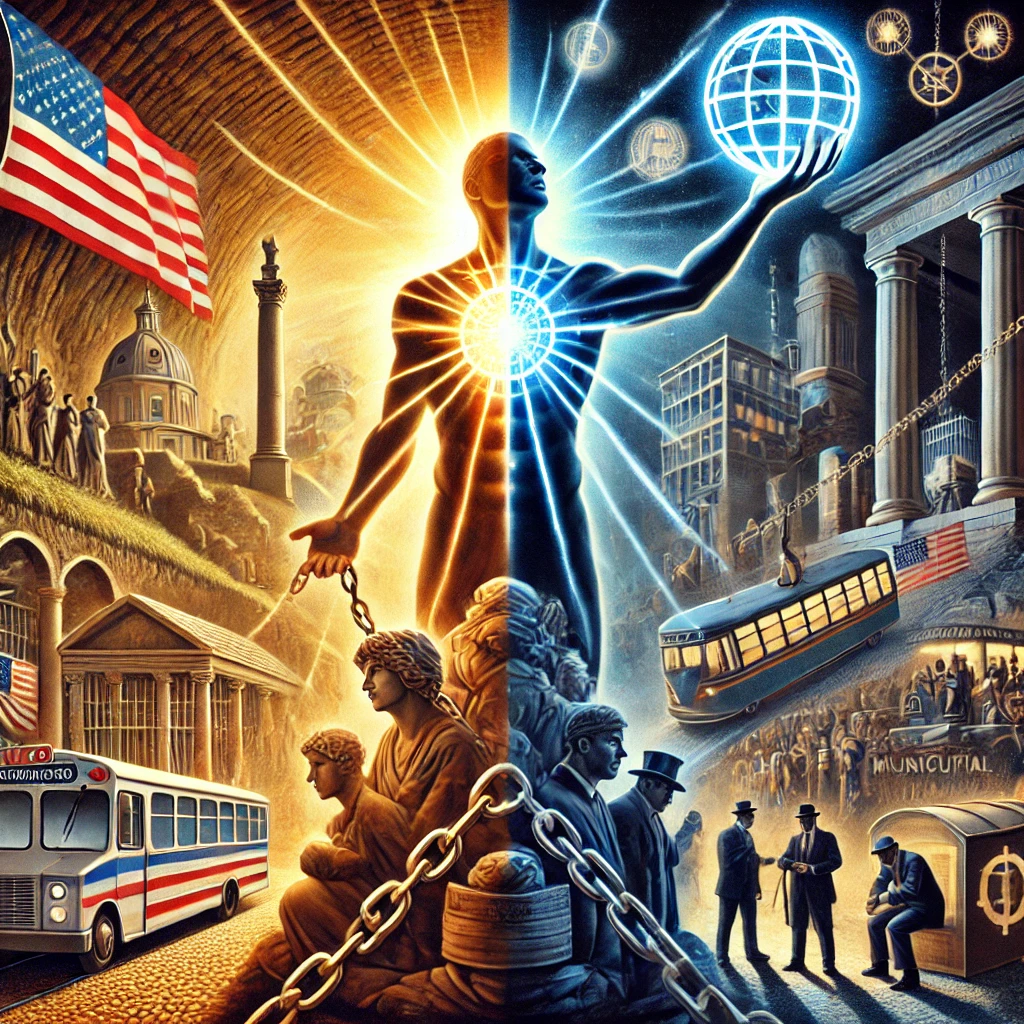Chapter 39 — A Race of Slaves
byChapter 39 – A Race of Slaves begins with a sharp contradiction: Americans, once heralded as champions of liberty, are now portrayed as willing participants in a system that diminishes their individual rights. The chapter opens by acknowledging the expansive influence Americans have abroad—bringing progress to Europe, electrifying ancient spaces, and exporting innovation. Yet, at home, the same people submit passively to trivial bureaucratic powers. This irony forms the core of the chapter’s critique. Where once there was rebellion against oppressive rule, now there is obedience to inefficiency and impersonal authority. Americans, the author argues, are no longer the heirs of revolutionaries—they are participants in a slow-moving, self-imposed servitude.
The contrast becomes more vivid through anecdotes drawn from public transportation. A train journey from Washington to New York, interrupted by an unexplained 40-minute delay, is accepted without protest by the passengers, including the narrator. Rather than resist or even question the delay, the people simply wait, demonstrating how conditioned they’ve become to tolerate inefficiencies. Similarly, in streetcars, travelers are expected to move quickly and conform to arbitrary rules, reflecting a society where convenience is secondary to unquestioned compliance. The chapter also describes the strange ritual of “brushing”—a forced cleaning of clothes in trains, done without consent. These experiences, though seemingly minor, serve to illustrate a broader erosion of personal agency in daily American life.
The critique extends to customer service, which the author compares unfavorably to Europe. In shops, restaurants, and hotels, Americans are often treated with indifference or even subtle disdain by staff. Despite being the paying customer, they tolerate poor treatment with surprising patience. The author suggests this dynamic is rooted in the same passive mindset that tolerates delays and discomfort on trains. In Europe, the author contends, the customer retains a greater sense of dignity and control. The social contract there appears more balanced—respect is mutual, not conditional.
What emerges is a portrait of Americans as fearful of disruption, fearful even of those who serve them. A particularly telling example involves a friend who was removed from a theater simply for expressing dissatisfaction. The act of hissing, a minor expression of critique, results in immediate ejection. The message is clear: dissent is not welcome, not even in spaces meant for public enjoyment. This submission to minor authority figures—ushers, clerks, bellboys—is a recurring motif throughout the chapter. It isn’t just about poor service; it’s about how Americans have been trained to accept mediocrity and disrespect in exchange for perceived order and routine.
The narrative ends on a reflective note, emphasizing the cultural shift that has taken place in a nation founded on rebellion. Americans no longer fight against minor tyranny; they accommodate it. The “race of slaves” isn’t bound by chains or laws, but by internalized habits of compliance and fear of confrontation. Even the domestic staff, who traditionally held subordinate roles, are described as wielding power through subtle manipulation and social influence, a reversal that underscores how much autonomy the average American has surrendered. The irony is bitter: in striving for comfort and efficiency, people have lost their voice. They avoid complaint, not out of politeness, but from a learned helplessness that corrodes civic strength.
Ultimately, Chapter 39 serves as a biting critique of how easily freedom can be surrendered not through conquest, but through routine. It warns that the erosion of liberty does not always arrive with thunder—it often comes quietly, in the form of train delays, rude clerks, and shrugged shoulders. The author challenges readers to recognize these small indignities for what they are: symptoms of a deeper cultural illness. By tolerating these slights, Americans risk becoming complacent in their own subjugation. The revolution may have promised freedom, but the daily habits of the modern citizen suggest a different reality—one marked not by liberty, but by quiet, willing servitude.


